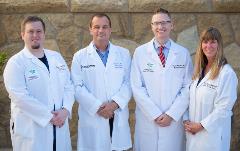
Advances within Ridley-Tree Cancer Center’s Nuclear Medicine Department place this program at the forefront of this field, and on par with major hospital systems. A new highly-advanced but minimally-invasive therapy which uses TheraSphereTM Y-90 Glass Microspheres,
is now offered in our community to treat tumors in the liver. TheraSphereTM allows for precise delivery of high-dose radiation to targeted regions of the liver through arteries which supply blood and nutrients to the cancer. This
therapy can be used to slow tumor growth with the potential of eliminating the tumor altogether. During the procedure performed by radiologist Manu Singh, MD at Santa Barbara Cottage Hospital’s Interventional
Radiology Suite, millions of micro-sized glass beads containing radioactive Yttrium-90 are sent directly into the tumor, sparing surrounding healthy tissues and internal structures which otherwise may have required a lower-dose of radiation
or a less-effective treatment. The dose calculation and imaging is conducted by Ridley-Tree’s Nuclear Medicine Department.
Nuclear medicine physicians William Pace, MD and David Carlson, MD, along with nuclear medicine technologists Tricia Peters, CNMT and Nicholas Heath, R.T.(R)(N), collaborated with Cottage
Health on this achievement. “We are proud to partner with gifted young physicians like Dr. Singh to bring cutting edge treatments and techniques to Santa Barbara,” commented Dr. Pace, Ridley-Tree’s Nuclear Medicine
Director. “We strive to provide a sophisticated array of therapies and the Y90- Microsphere program is a validation of what can be achieved when talented people across multiple departments collaborate to achieve a common goal.”
Theranostics is the term used to describe the combination of using one radioactive drug to identify (diagnose) and a second radioactive drug to deliver therapy to treat the main tumor and any metastatic tumors. The word Theranostics is
a combination of the terms therapeutics and diagnostics. This fall, the Nuclear Medicine Department began offering the theranostic Dotatate (diagnostic) and Lutathera® (treatment) for patients with
pancreatic-based neuroendocrine tumors as well as neuroendocrine tumors in the gastrointestinal tract. Recently approved by the FDA, Lutathera helps to reduce disease progression by delivering radiation directly to the tumors while sparing the normal
cells, similar to TheraSphereTM. Until recently within California, this treatment has only been available at large academic institutions in the Los Angeles and San Francisco areas. Drs. Pace and Carlson will collaborate with Ridley-Tree’s medical
oncologists to offer patients with these more rare cancers another treatment option.